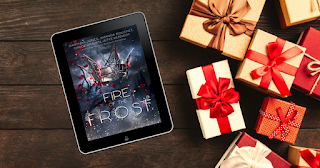This week at the SFF Seven we're doing a little winter holiday self-promo! Many of you know we had to push back the release of
FIRE OF THE FROST, but it's coming soooooon! We are on target to release on December 22. So if you are someone who celebrates Christmas, this should hit your eReader just in time to relax and enjoy some holiday downtime.
And if you don't celebrate Christmas, there's lots of midwinter, romantic holiday goodness for you, too! Only Amanda's story is literally Christmas. Everyone else's is a fantasy midwinter holiday. Mine includes a magical sleigh race and elemental festive lights. It's a story that takes place in the Bonds of Magic world, roughly after DARK WIZARD and semi-concurrent with BRIGHT FAMILIAR. It takes place at Convocation Academy and you just miiiiigght see some of the characters in GREY MAGIC.
The delay means you have just that much longer to preorder the anthology for the special preorder price, before it goes up on release day.





Here's the official (still in progress) blurb:
A midwinter holiday fantasy romance anthology…
From
Darynda Jones, a standalone novella set in a world where vampyres are hunted
for sport. The only thing standing between them and total annihilation is
Winter, a warrior bred to save them from extinction. Forbidden to fall in love,
Winter cares only about her oaths… until she meets the devilish prince of the
underworld.
Of Fate and Fire by
Amanda Bouchet
The Kingmaker Chronicles meets modern-day New York City! Piers, an
exiled warrior from Thalyria, finds himself in the Big Apple just before the
holidays. The world and everything in it might be utterly foreign to him, but
that won't stop Piers from helping to complete a vital mission for Athena and
protect Sophie, a French teacher from Connecticut who's suddenly knee-deep in
inexplicable phenomena, danger, and henchmen after an Olympian treasure that
should never have ended up in her hands—or remained on Earth after the Greek
gods abandoned it.
The King of Hel by Grace Draven
A
novella-length expansion of a stand-alone short story in which a cursed
mage-king from a frozen kingdom is obligated to marry a woman of high-ranking
nobility but meets his soulmate in a lowly scribe.
Familiar Winter Magic by
Jeffe Kennedy
It’s holiday time at Convocation Academy, but best friends Han and
Iliana are finding it hard to celebrate. As a familiar, Iliana is facing her
assignment to a life of servitude to a wizard, very soon. And Han… despite
being tested by the oracle daily, he is still uncategorized. As Iliana and Han
face being separated forever, they at last find the courage—or desperation—to
break the rules and acknowledge their deeper feelings for each other. But it
will take more than true love to save them from the laws of the Convocation…





And here's a little snippet from my story, Familiar Winter Magic:
Once the races
finished, Iliana let Han talk her into more dancing. With the excellent whiskey
warming her blood, not to mention the heady glow of Han’s undivided attention,
she could hardly resist. She loved him so much and he was right: this was their
last Founding Festival together. Rather than try to hold him at arm’s length,
in anticipation of their imminent parting, she decided to enjoy his company
while she could.
Han at his most
charming was impossible to refuse. Which would be a major problem when he
manifested as a wizard, but she wouldn’t think about that tonight. Since it was
a holiday, the thought-seekers gave everyone a break—and were celebrating
themselves. The festival was a rare excuse for everyone to loosen up.
A little bit
tipsy, the lights and dancing making her feel giddy, she danced with Han until
she was so warm she had to shed her cloak. Among his many skills, Han was also
an excellent dancer—far better than she, but he was so skilled that he made his
partner look good—and they found themselves more than once in a circle of cheering
spectators as he whirled her through the vigorous dances.
Then the music
slowed, and she fanned herself, blowing out a breath, and headed off the dance
floor. Han caught her hand. “Hey, where are you going?” Expertly he twirled her
under his arm, then snugged her close, a hand on the small of her back as he
led her through the dreamy rhythm.
Iliana braced one
hand on Han’s chest, his heart thumping rapidly beneath her fingertips, his
blue eyes lambent in the starry light. “We never dance the slow dances,” she
breathed.
“A grievous lapse
of judgment on my part,” he murmured, gaze traveling over her face. “You feel
perfect in my arms, lovely Iliana. I want you here forever.”
She tore her gaze
from his heartbreakingly beautiful face, focusing on his throat instead. That
wasn’t much help, as his skin begged to be kissed and nibbled. “I don’t
understand what’s changed between us, why you’re being so…”
“Seductive?” he
suggested in a warm purr. “Devastatingly handsome and charming?”
Snorting, she made
a face at him. “Aggressive. And annoyingly persistent.”

































